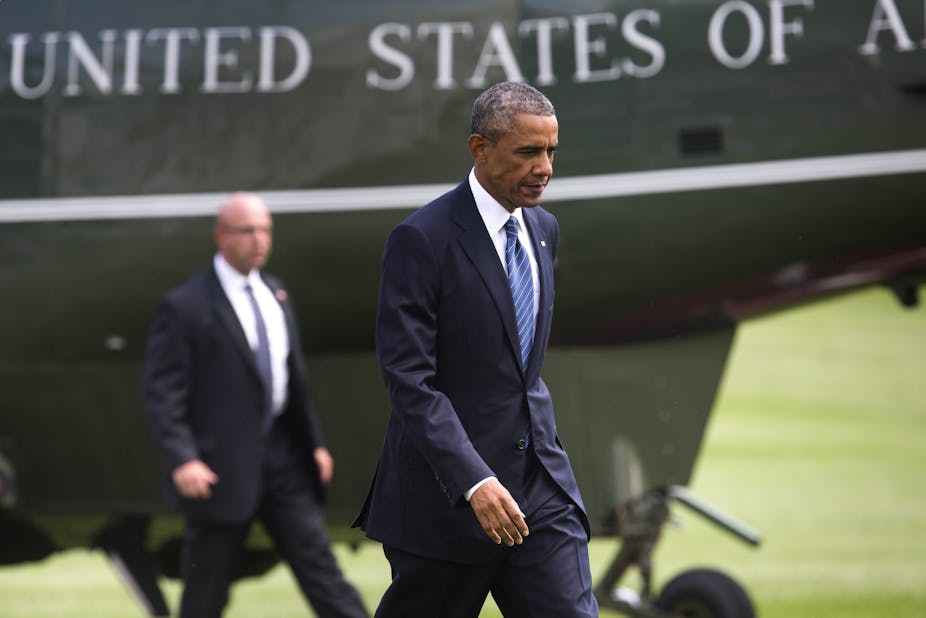UPDATED AT 4:30PM AEST: The most interesting part of US President Barack Obama’s much-anticipated televised address today was not the unsurprising news of increased allied strikes against Islamic State (IS) militants in Iraq and Syria.
Instead, the real intent of his televised address appears to have been to provide a counter narrative to IS: appealing to the Muslim world that the US wants to work with them, not against them. That’s why he continues to use Islamic State’s previous name ISIL (the Islamic State of Iraq and the Levant), and why he stressed in his speech today that:
ISIL is not Islamic. No religion condones the killing of innocents. And the vast majority of ISIL’s victims have been Muslim.
But will this counter narrative go far enough to persuade new recruits from joining IS? Judging from the recent wars in Afghanistan and Iraq, it is clear that an increase in military action in Syria and Iraq will not offer a straightforward solution. Rather, by taking sides in complex sectarian and ethnic struggles, increased military involvement will invite a series of unintended consequences. These could escalate the already volatile situation in the region, endanger more innocent civilians and radicalise others into fighting.
Complex conflicts
Recent history shows that military intervention in Afghanistan and Iraq was complicated, unsuccessful and unresolved. We saw community tolerance and political acceptance of the military presence in those countries changing over time. Soldiers who were initially seen as saviours were eventually viewed with outright hostility.
Inevitably, the military’s presence in Afghanistan and Iraq compounded the problem of conflicting factions and eventually came to be popularly viewed as an additional problem. The allied military intervention radicalised and mobilised not only the communities the West was trying to protect (or liberate), but also others in faraway countries who viewed Western interference in holy lands as another sign of Muslim oppression.
The withdrawal of military forces from Iraq left a void now filled by IS. By declaring the caliphate and setting up a “state”, IS has attracted thousands of foreign jihadis and even experts from abroad.
It is difficult to calculate what number of foreign fighters will eventually join IS in Iraq and Syria. If Afghanistan is anything to go by, “where up to 20,000 foreigners participated over the course of a decade”, the final numbers in Iraq and Syria could dwarf these figures. Experts estimate the number of foreign fighters in Syria to be more than 12,000, hailing from 74 countries.
The threat of home-grown terrorism
Increasing military action overseas will also have a knock-on effect at home. Obama’s announcement of increasing military action is likely to aggravate or frustrate IS supporters who haven’t been permitted to travel to the conflict zones. They may, instead, wish to demonstrate their support by potentially carrying out attacks at home.
This threat is very real. In her evidence to the Chilcott inquiry in 2010, the former head of MI5 explained that the UK’s participation in the last Iraq war substantially increased the threat of terrorism to the country. Less than two weeks ago, the UK raised its terrorism alert status from “substantial to severe” in response to conflicts in Iraq and Syria. The new alert level rates the risk of an attack inside the UK as “highly likely”.
Australia’s terrorism threat level also looks set to rise from medium to high, after ASIO warned the government it had become increasingly concerned about the high likelihood of an attack on home soil. Whether raising it will exacerbate the threat will depend on Australia’s contribution to Obama’s military strategy.
The challenges ahead
Western governments are likely to face a conundrum when the Hajj, a significant date in the Muslim calendar, falls in October. Increased military action will no doubt aggravate many IS supporters who haven’t been able to travel in the annual pilgrimage to Mecca. It will be difficult for governments to discern between those simply wanting to take their pilgrimage and those embarking to fight overseas with IS.
The best defence against radicalisation and boosting IS numbers is to avoid gratuitous military attacks that can be perceived as Western attacks on Muslim countries. As a breakaway group from al-Qaeda, Islamic State shares its narrative of a Western war on Islam. IS’s recruitment strategy and barbaric behaviour are underscored by their justification that corrupt and foreign military forces have invaded or occupied Muslim holy lands and have killed tens of thousands of innocent Muslims.
Any military intervention will play into IS’s hands, and is likely to result in a more acute crisis that will encourage, rather than discourage, radical individuals to pour into Syria and Iraq to boost the terrorist group’s numbers.
A significant offshoot of increasing military intervention will be civilian casualties. Modern military forces will always face difficulties countering enemies that comprise groups of loose, shifting and disparate units of fighters that take refuge among the civilian population.
Sending the military to cure social problems or religious divides or to wage war on non-traditional opponents will always be problematic. Terrorism should be viewed as a long-term problem that must be understood, contained and treated.

